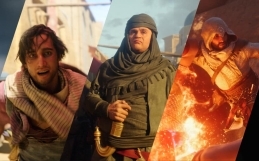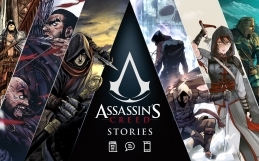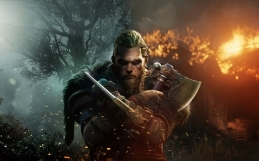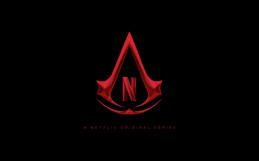- Sigurd Styrbjornson is Eivor’s brother by adoption. After the death of Eivor’s parents at a young age, Eivor was taken in by Sigurd’s father, King Styrbjorn of Forberg
- As was custom among the Norse, Eivor was raised as one of Styrbjorn’s children, with no differentiation made between blood relatives and adopted relations.
- Sigurd is five years Eivor’s senior and has helped mold Eivor into the warrior we know today.
- As the son of a King, Sigurd expects to follow in his father’s footsteps and lead their clan with Eivor as his right hand.
- Sigurd is a proud and charismatic man, full of confidence and the desire for adventure. But there is a darker side to him as well, one that begins to trouble Eivor as our story moves forward.
- Eivor as an exemplar of what we felt was a particularly Nordic sensibility – possessed by a deep sense of honor, devoted to family, unflappable in times of strife, unwilling to suffer fools, and possessed of a gallows humor. The character Egil, from the famous “Egil’s Saga” was one such reference, and although our Eivor is not as moody and prone to wanton violence as Egil, they do share some traits. Both have a penchant for spitting poetry when the mood strikes them, and both have an unshakable sense of honor when it comes to oaths and a person’s reputation.
- Eivor is a fixed character with a consistent personality. We want everyone who plays Assassin’s Creed Valhalla to come away with the same sense of who this character is and what motivates them. However, players will have many opportunities to shape the outcome of scenes and stories based on how they direct Eivor to respond in conversation.
- In the early hours of the game, Sigurd returns from a long voyage that has taken him to Constantinople and back. It was in that city he met and befriended the Hidden Ones
- All alliances in Assassin’s Creed Valhalla are governed by the stories told, not by a game system. There is some variability in which alliances Eivor can make, but they are largely fixed by the stories being told, honoring historical context and accuracy.
- The Sons of Ragnar are Viking invaders who claim to be the sons of the Legendary Ragnar Lothbrok, a Viking king who was killed by the Northumbian king Aella almost a decade earlier.
- The Sons of Ragnar – Ivarr, Ubba, and Halfdan – have been in England for over five years now, vowing revenge on the kingdoms and men who murdered their father.
- Each of the Sons of Ragnar has a unique and compelling personality; Ivarr is wild and unpredictable, a fading rock star; Ubba is stalwart and steady with dreams of a pacified England for Danes and Saxons alike; and Halfdan is a kingly figure – wise, powerful, and yet paranoid that all his earthly gains will come to nothing in the end.
- The Order of the Ancients are the Hidden Ones’ current enemies in Assassin’s Creed Valhalla, and they have overtaken England with the aim of spreading their retrograde views.
- Narrative Director Darby McDevitt states that they have taken great pains to dive deep into the beliefs of the Order of the Ancients in our game, beliefs that differ somewhat from the Templars as we know them today.
- At its core, Assassin’s Creed Valhalla is a story of how Eivor and Sigurd and the rest of their clan have a deep and permanent impact on the future of these two groups.
- The stories of Assassin’s Creed Valhalla are modeled after the Norse sagas, some of the earliest examples of western literature on record. As such, Valhalla feels more like a picaresque – like “Don Quixote” or “The Adventures of Huckleberry Finn.” It is an epic journey full of smaller self-contained stories, all of which orbit themes of honor, reputation, glory, and leadership. Of course, there is a core emotional story running through all this, and players will watch Eivor go through a series of devastating hardships. All that to say, buckle up for a saga unlike any you have yet seen.
- Regarding multiple endings, Darby McDevitt stated that its hard to answer that question without getting into spoiler territory, but he proceeded to add that there are multiple fascinating pathways through our epic tale, a story modeled after the Norse sagas of old, in which men and women fought hard against fate, eager to forge their own path, yet always failing, time and time again.
For the original interview, please click here.
Related Posts








